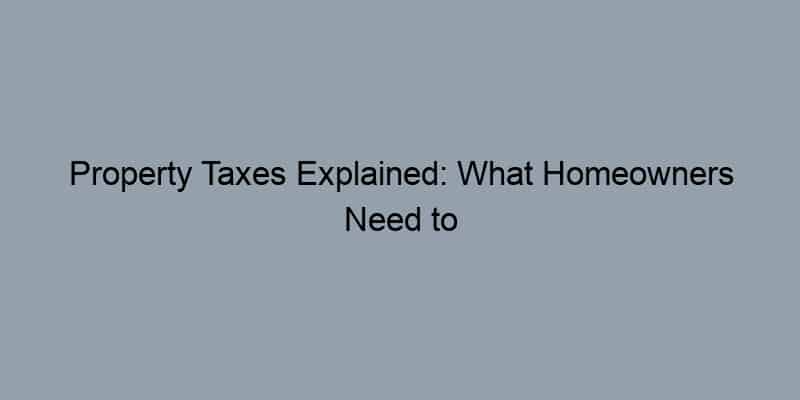When it comes to owning a home, understanding property taxes is not just a luxury; it’s a necessity. Property taxes can often feel like a hidden pitfall in the exhilarating journey of homeownership. If you’re a new homeowner or even just considering buying a home, you’ll want to read this article to uncover the truths about property taxes that could save you thousands of dollars or help you make wiser investment choices!
What Are Property Taxes?
At its core, property tax is a tax based on the value of real estate. Local governments—like cities and counties—levy these taxes to fund essential public services such as schools, infrastructure, and public safety. While the idea of contributing to communal resources sounds fair, the world of property taxes can be complex, and unfortunately, many homeowners are left in the dark.
The Basics of Property Taxes
-
Assessment: The first step in determining your property taxes involves the assessment of your home’s value. Local assessors inspect residential properties, taking into account various factors such as size, location, condition, and amenities.
-
Tax Rate: Next comes the tax rate, established by your local government. This rate varies widely depending on where you live, with some regions imposing higher taxes to fund better services. It’s worth noting that tax rates are often expressed as a dollar amount per $1,000 of assessed value.
-
Calculating Your Bill: To find the amount owed, simply multiply your home’s assessed value by the local tax rate. For example, if your home is valued at $300,000 and your area has a tax rate of $2.00 per $1,000, your annual property tax bill would be $600.
Why Should Homeowners Care About Property Taxes?
As a homeowner, the implications of property taxes can’t be overstated. They can impact your monthly budget, affect your mortgage terms, and even sway your long-term financial plans. Here are several compelling reasons why understanding property taxes is essential:
-
Budgeting: Many homeowners forget to factor in property taxes when calculating their monthly expenses. Being blindsided by a large bill can destabilize your finances.
-
Investment Value: High property tax rates can depress property values over time, making it essential to consider the tax climate in any neighborhood you’re thinking of investing in.
-
Community Services: Your property taxes fund local services. Fewer taxes can equate to fewer services, affecting your quality of life, school quality, and neighborhood upkeep.
Common Misconceptions About Property Taxes
1. “Property Taxes Never Change”
One of the most widespread misconceptions is that property taxes are static. On the contrary, changes in local government funding needs, such as the addition of new services or roadwork, can easily lead to increased tax rates.
2. “I Can’t Challenge My Assessment”
Homeowners do have the right to appeal property assessments. If you believe your property has been overvalued, gathering comparable sales data to support your case can often lead to a reduction in your assessed value.
3. “Property Taxes Are Deductible”
Another common belief is that you can deduct all property taxes from your income tax. While it’s true that some property taxes are deductible, changes in tax laws have affected what can be deducted—so it’s crucial to stay informed.
FAQs: Property Taxes Every Homeowner Should Know
1. What Happens If I Don’t Pay My Property Taxes?
Failure to pay property taxes can lead to serious consequences, including penalties, interest, and eventual foreclosure. Always prioritize your tax obligations to avoid losing your home.
2. How Often Are Property Taxes Assessed?
Most local governments assess property taxes annually, but some areas may use a different schedule (such as bi-annually or semi-annually). Check with your local tax authority for specific timelines.
3. Can I Get Help with My Property Taxes?
Yes! Many local governments offer assistance programs designed to help low-income families, seniors, or disabled individuals reduce their property tax burden. Be sure to inquire about these programs in your area.
4. Will My Property Taxes Go Up If I Improve My Home?
Yes, typically. Enhancements such as adding a bathroom or finishing a basement can increase your home’s assessed value, which in turn can lead to higher property taxes.
5. How Can I Stay Informed About Changes to Property Taxes?
Staying in touch with your local government’s website and attending community meetings can help you stay informed about property tax changes and how they may affect you.
Conclusion
Understanding property taxes doesn’t have to be a daunting experience. By staying informed and seeking reliable resources, you can effectively manage your property tax obligations and make smarter decisions about your financial future. Whether you’re looking to buy a new home or bewildered by rising property taxes, knowledge is power—particularly when it comes to safeguarding your investments.
To make your life even easier, consider using OfficialPropertyRecords.org for free property records. It will not only help you track your property tax information but also assist you in understanding its history and trends, ensuring that you never put yourself in a precarious financial position regarding property taxes. Take control of your homeownership journey today!

